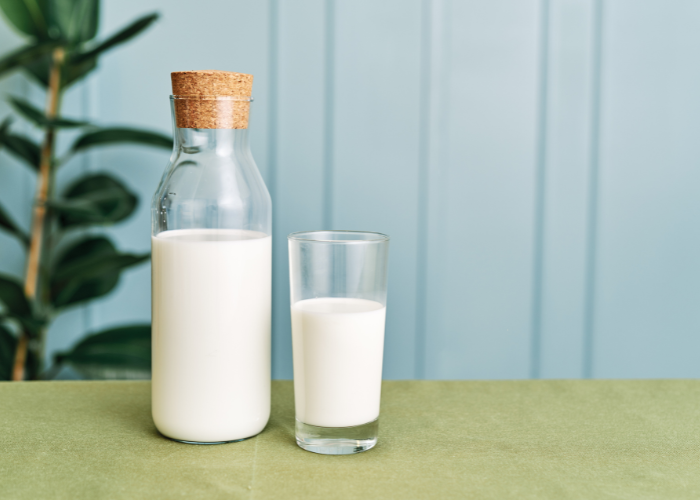Dairy’s Essential Role in Nourishing the First 1,000 Days
The first 1,000 days (between pregnancy and a child’s second birthday) is a time of rapid growth and development. Nutrition plays a critical role in supporting healthy growth, making it essential for pregnant mothers and young children to have a healthy diet and make informed decisions about food and drink.
Dairy plays a uniquely beneficial role in your diet during the first 1,000 days, offering a nutrient-rich package that supports various aspects of early development. From pregnancy through early childhood, dairy products like milk, cheese, and yogurt provide essential nutrients that promote brain health, bone and muscle development, immune health, growth and development, and help close the gap on iodine deficiency.
BRAIN HEALTH

Proper nutrition during pregnancy and early childhood lays the foundation for cognitive abilities, motor skills, and socio-emotional development, which are crucial for future success in school and future economic opportunities. The first 1,000 days are a period of rapid brain growth, faster than at any other time during someone’s life. To support this critical development, children require the right nutrients such as dairy foods like milk, cheese, and yogurt. Dairy foods have 7 of the 14 nutrients recognized by the American Academy of Pediatrics as critical for early brain development, including protein, zinc, selenium, iodine, choline, vitamin B12, and vitamin A.
BONE AND MUSCLE DEVELOPMENT

Bones form the structural foundation of a growing body, and maintaining bone health is also critical for muscle health. Building more bone mass during childhood and adolescence is critical as it significantly reduces the risk of osteoporosis and related injuries later in life.
Dairy products are unparalleled in their bone-building nutrients, providing more than any other food group. The protein, calcium, vitamin D, phosphorus, potassium, and zinc found in dairy foods are all critical components of bone and muscle health and development. You don’t have to take our word for it. The American Academy of Pediatrics, The National Institutes of Health, and the 2020-2025 Dietary Guidelines for Americans all recommend consuming dairy foods daily to ensure peak bone mass is achieved.
IMMUNE HEALTH

A strong immune system is essential for overall health and well-being. Nutrients from a variety of foods, including dairy, help support our immune system with the constant supply of energy and nutrients it needs to defend and protect the body.
By meeting the recommended daily intake, pregnant mothers and young children can help nourish their immune systems with dairy thanks to its immune-important nutrients. Those important nutrients found in dairy foods include protein, zinc, selenium, vitamin A, vitamin D, and vitamin B12.
GROWTH AND DEVELOPMENT

Early childhood is critical for growth and development, requiring the right balance of nutrients like high-quality proteins that help keep weight gain on track. At about 6 months, it is time to introduce nutrient-dense, complimentary foods like cheese and yogurt. These dairy foods help familiarize babies with new tastes and textures, making it a great choice, even for picky eaters, and provide essential nutrients.
For children 1-5 years of age, experts, including the American Academy of Pediatrics, the Academy of Nutrition and Dietetics, the American Academy of Pediatric Dentistry and the American Heart Association, recommend cow’s milk and water as the go-to beverages. They do not recommend plant-based alternatives because they lack consistent nutrient content and limited evidence of positive health outcomes.
GETTING ENOUGH IODINE

Some women, especially those who do not regularly consume dairy, eggs, seafood, or iodized table salts, may not eat enough iodine to meet the increased demand during pregnancy and lactation. Getting enough iodine during this sensitive period of growth and development is important for metabolism and brain and bone development.
Milk, cheese, and yogurt are an affordable and effective source of iodine (about 20 cents per 8-ounce serving). Just one cup of low-fat milk provides 59% of the daily suggested iodine consumption. 6 ounces of Greek, plain, fat-free yogurt provides 58%, ½ cup of cottage cheese (reduced fat) at 26%, and only three slices of Swiss cheese at 24%. Compare that to 1 cup of most soy and almond milk alternatives, which only provides 1%.
WHEN SHOULD MY BABY BEGIN DRINKING MILK?

- 0-6 months: Breast milk or infant formula only.
- 6-12 months: Breast milk or infant formula with nutrient-rich complementary foods like yogurt and cheese.
- 12 months: Transition to whole dairy milk. Breastfeeding can continue if desired.
- 2-5 years: Switch to low-fat or fat-free dairy milk at meals and water in between meals.
HOW MUCH DAIRY SHOULD MY CHILD HAVE?

- 6-12 months: Introduce yogurt and cheese.
- 1-2 years: Aim for 1 ⅔ - 2 cups a day.
- 2-3 years: Aim for 2 - 2 ½ cups a day.
- 4-8 years: Aim for 2 ½ cups a day.
- 9+ years: Aim for 3 cups a day.
TIPS AND TRICKS FOR INTRODUCING HEALTHY FOODS

- Eat family meals: Infants model food behaviors from others.
- Be patient: It can take more than 10 times for an infant to accept a new food.
- Start small: One bite is a great start.
- Encourage exploration: Making a mess is part of learning.
- Trust their gut: Toddlers know when they are full.
- Multiple meals and snacks: Aim for 3 meals and 2-3 snacks.
Add dairy foods: Dairy foods are versatile and can help enhance the consumption of other food groups. Introducing unsweetened plain yogurt and cheese at six months can familiarize babies with new tastes and textures. Mixing dairy with fruits, vegetables, or whole grains can make healthy eating enjoyable for young children.
The first 1000 days are a critical window for ensuring lifelong health and development. By incorporating dairy into your child's diet, you can provide essential nutrients that support brain health, bone and muscle development, immune health, and overall growth. Establishing healthy eating habits early on sets the stage for a lifetime of wellness.







